These photos are from my week in Erbil, Iraq. Click on a thumbnail photo to see all of the photos full-screen.
-
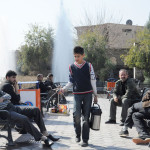
-
This boy and his friend sell Nescafe outside of a mosque. Alix Hines/MEDILL
-
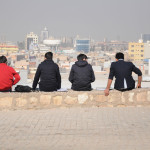
-
The view from Citadel in Erbil, Iraq. Alix Hines/MEDILL
-
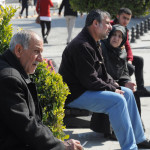
-
These people were sitting outside of a mosque. Alix Hines/MEDILL
-
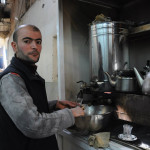
-
A guy making tea in the marketplace outside of the Citadel. Alix Hines/MEDILL
-
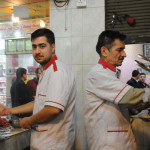
-
These two guys were making kebabs in Erbil’s marketplace. Alix Hines/MEDILL
-
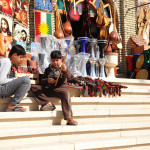
-
These boys are playing with instraments outside of a shop in the marketplace. Alix Hines/MEDILL
-
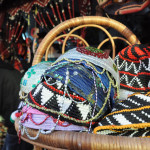
-
Traditional Kurdish hats. Alix Hines/MEDILL
-
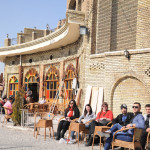
-
Part of our IYLEP group outside and drinking Iraqi tea just below the Citadel. Pictured left to right Dania Banaa, Alix Hines (me), Michelle Webb, Karam Endzeit, San Nihad and Gandhi Isaac.
-
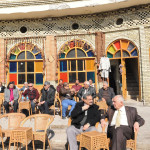
-
People sat outside of a cafe drinking Iraqi tea. Alix Hines/MEDILL
-
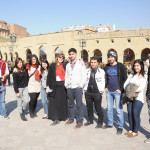
-
We got a group picture just before finding a shady spot to rest. Pictured left to right Mustafa Ali, Lilian Odish, Dania Banaa, Alix Hines (me), Michelle Webb, Laween Qasim, San Nihad, Karam Endzeit, Razhan Muhamad and Ammar Asmaro.
-
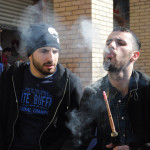
-
IYLEP students enjoy a hookah break during our tour of the market in Erbil. Pictured left to right, Karam Endzeit, Ammar Asmaro and Gandhi Isaac. Alix Hines/MEDILL
-
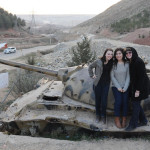
-
We are standing on one of the three tanks leftover from Saddam Hussein’s regime right outside of Erbil. Pictured left to right, Alix Hines (me), Razhan Muhamad and Michelle Webb.
-
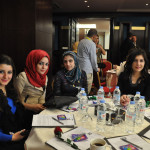
-
IYLEP students, Maryam Sarsam, Zaharaa, Sarah Thamir and Razhan Muhamad at the reunion in the Canyon Hotel in Erbil, Iraq. Alix Hines/MEDILL
-

-
One of our IYLEP students, Ahmad Khalid, prepares for a feast at Dawa 2 Restaurant in Erbil, Iraq. Alix Hines/MEDILL
-
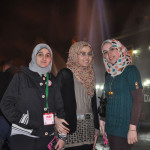
-
IYLEP students, Muklah Naji, Rasha Mahdi and Lubna Ala’a after our dinner at Dawa 2 Restaurant in Erbil, Iraq. Alix Hines/MEDILL
-
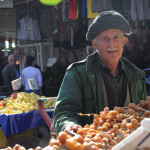
-
A man selling dates at the market in Sulaymaniyah. Alix Hines/MEDILL
-
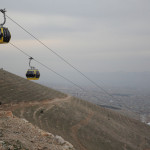
-
The mountains of Sulaymaniyah. Alix Hines/MEDILL
-
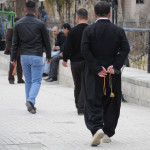
-
This man was walking around the marketplace in Sulaymaniyah after Friday prayers. Alix Hines/MEDILL
Most people are surprised when I tell them that I have friends in Iraq. Iraq to most Americans means war, insurgencies and terrorism. Iraqis seem like aliens, living in a completely different reality.
But for the past two years, I’ve spent one month each summer as a mentor for Iraqi students.
Five weeks in the U.S.
Each year the Iraqi Young Leaders Exchange Program, which is funded by the State Department through the U.S. Embassy, Baghdad and administered by the nonprofit Meridian International Center, brings 25 Iraqi college students to Virginia Commonwealth University’s Social Media Institute. The students spend five weeks working alongside American students, developing social media strategies for nonprofits in Richmond, Va.
What the Iraqis learn in that exercise helps them then design a project to implement in their hometowns in Iraq. They also participate in conflict-resolution workshops to hone their communication skills. They also are building skills that will help them get jobs when they graduate from college.
People like me serve as mentors; we and a program director spend the summer living in the dorms with the students, driving to historical spots in Virginia, camping and swimming in the ocean – often a first for the Iraqi students.
A week in Iraq
Six months later, I was boarding a plane to Dubai, en route to Iraq. I had tried to prepare myself to be open to a new way of life that I would experience in the short week I stayed in the Iraqi city of Erbil, which is located in the Northern, Kurdish region.
When my director, Michelle Webb, and I arrived in Erbil, it was 2 a.m. We were greeted by a group of our Iraqi students. I was in Iraq hugging a group of people I thought I might never see again. I couldn’t wait to be reunited with the whole group for a reunion. The reunion was funded by Meridian and it served as an opportunity for everyone to reconnect to discuss projects.
As you might expect, the week flew. I spent a day visiting the Citadel town in Erbil, which is a settlement that has been inhabited for more than 2,000 years. We traveled to Shaqlawa, outside of Erbil, to try the homemade sweets that are a specialty of the residents. There, we walked through the streets sampling sweets and trying Kurdish tea. On the way back to the hotel we stopped at the bottom of a large hill where three large tanks sat. My friends told me that they were there as a reminder of the overthrow of Saddam Hussein. We climbed onto the former dictator’s tanks on the hillside to take photos.
A few days later, the rest of our Iraqi students in the program arrived in Erbil. We spent two days talking about the projects they plan to implement in their hometowns. There also were workshops ranging from how the students could market themselves for careers to what to expect in the April 30, parliamentary elections.
I attended the workshop about the upcoming elections. The speaker asked whether Iraq is moving toward another dictatorship or a democracy. Students were asked to stand on the side they thought their country was moving toward. More than half moved to democracy but each provided an argument for improving what many consider a still corrupt democratic system.
As I sat there, listening to the arguments for democracy and the ideas to move the country forward, I knew why these students were chosen for IYLEP. In that moment, I saw leaders being born. In the coming years, as these young people take the lead in their country, I know that change for the better is possible.
Mahatma Gandhi once said, “Healthy discontent is the prelude to progress.” These young people have a vision for change for their country.
My takeaways from my short week in Iraq reinforce what I learned in two summers working with Iraqi students in the Virginia Commonwealth University program. The Iraqi people are resilient, generous and lively – not just the victims of a dictator or a people to be protected by American troops.
Journalists like me can serve both our country and Iraq by providing a more clear picture of the Iraqi population. Too much of the news from Iraq tells us what divides the country, but I learned that there are ways – through young people like those I know — to tell stories of what can unite the country.























